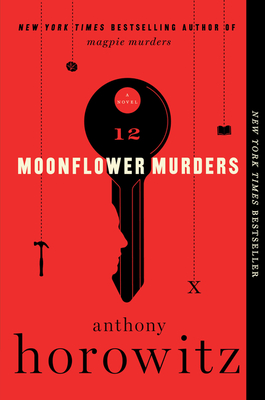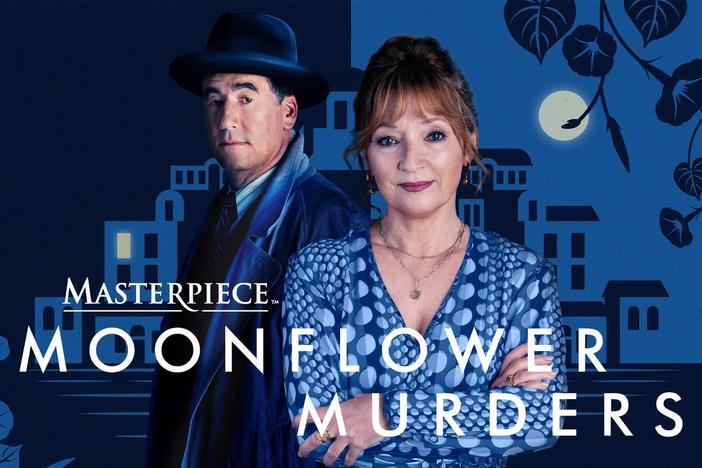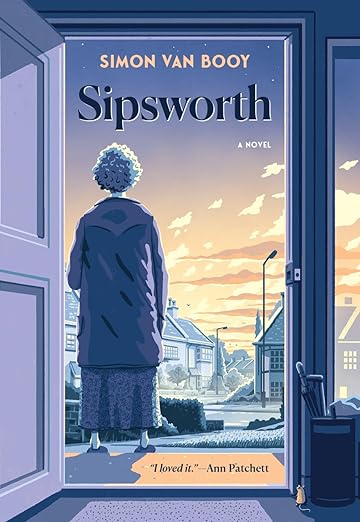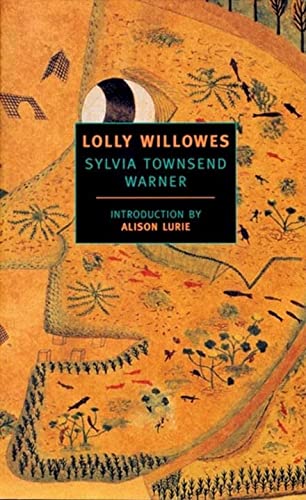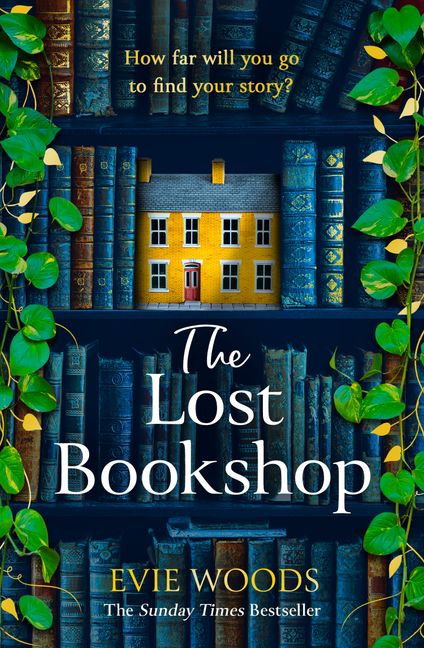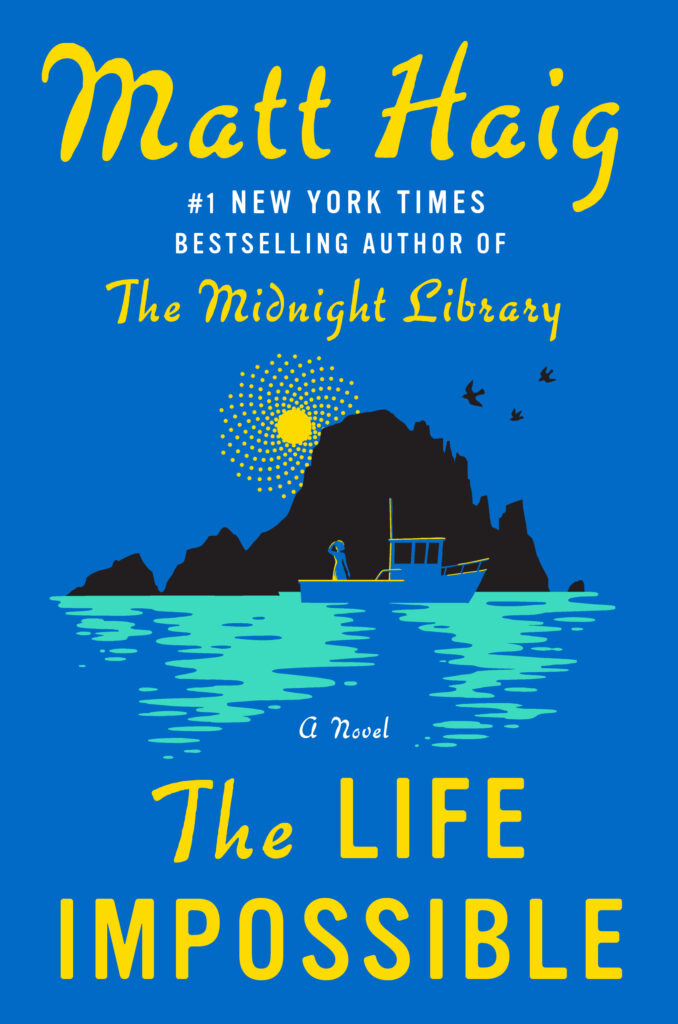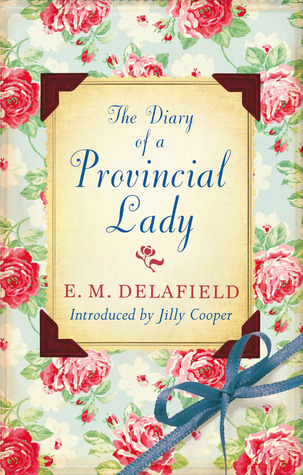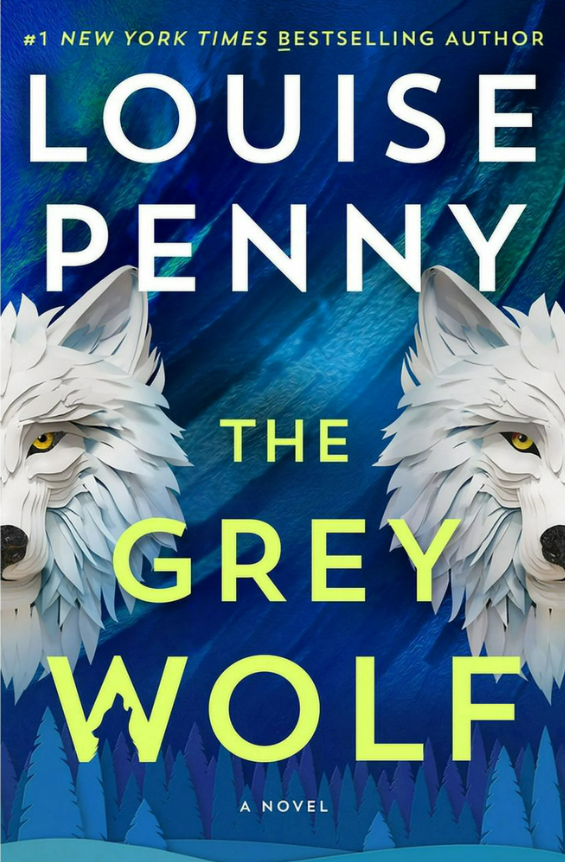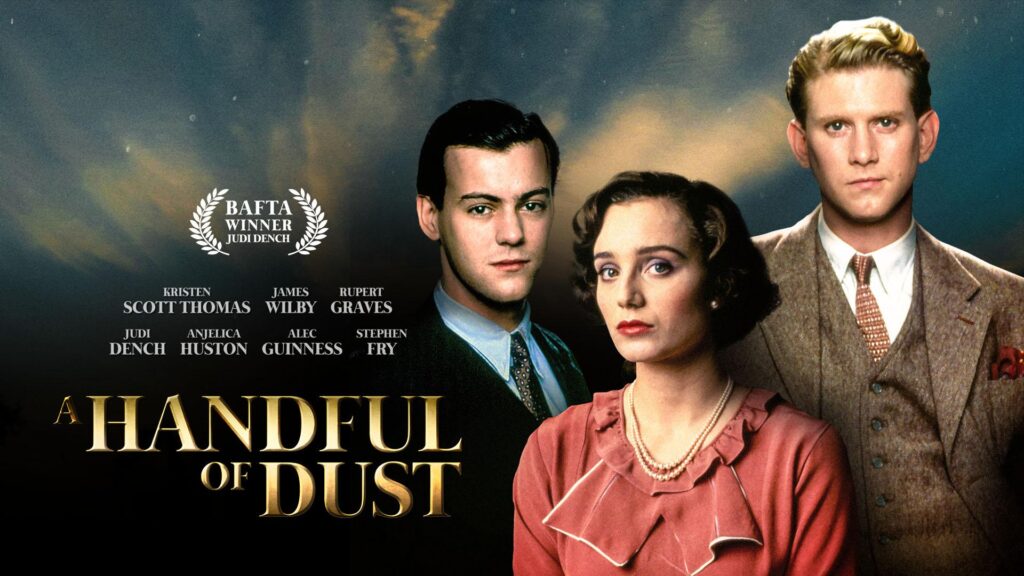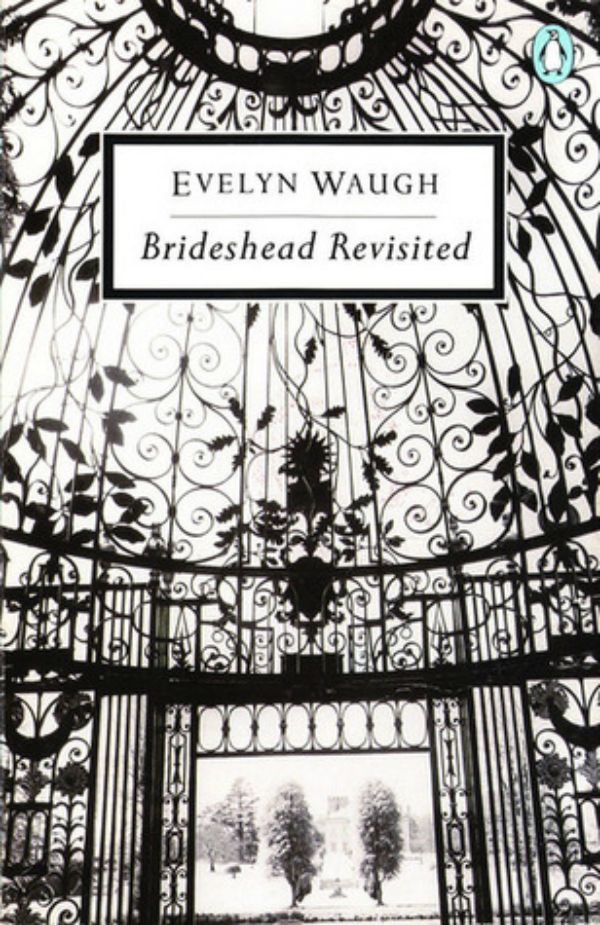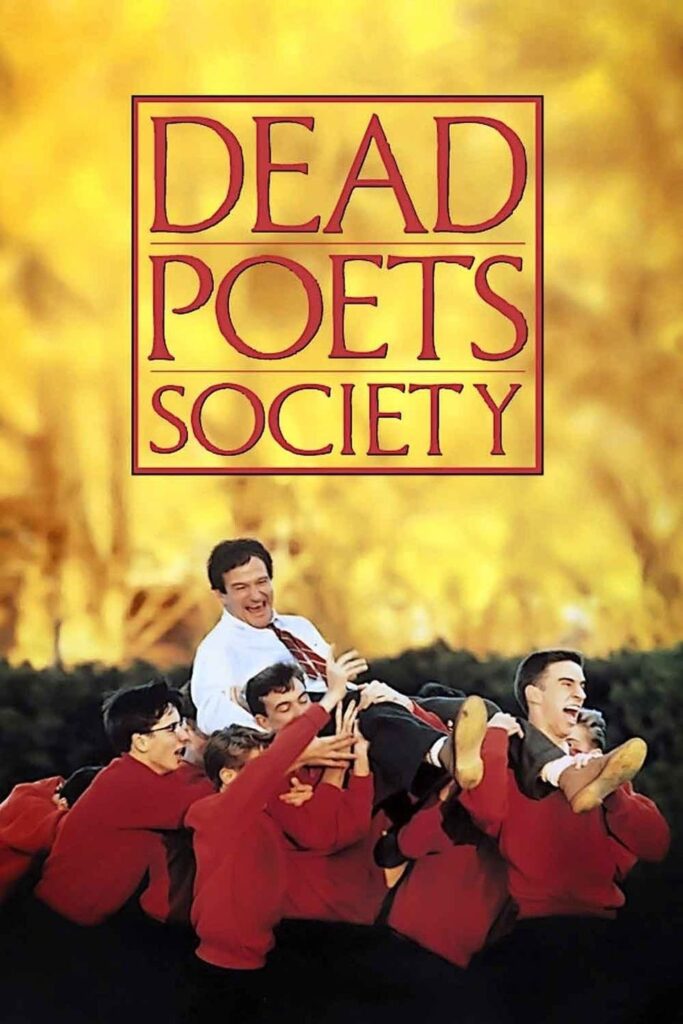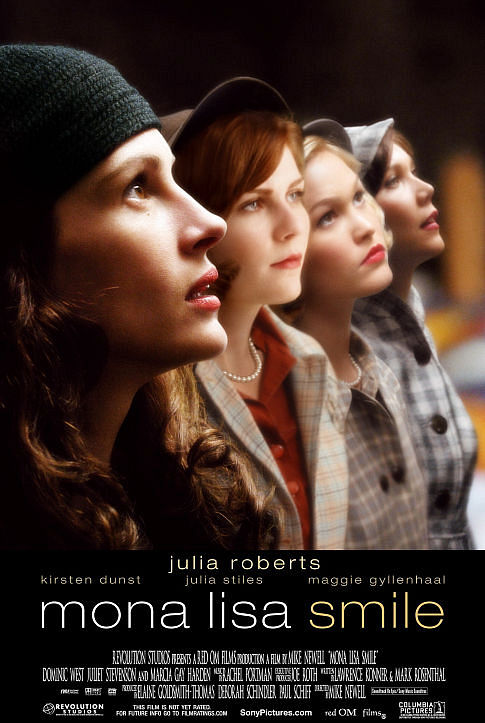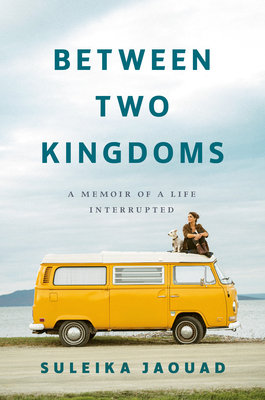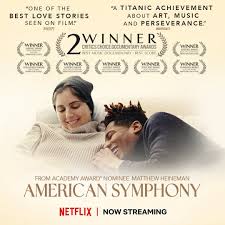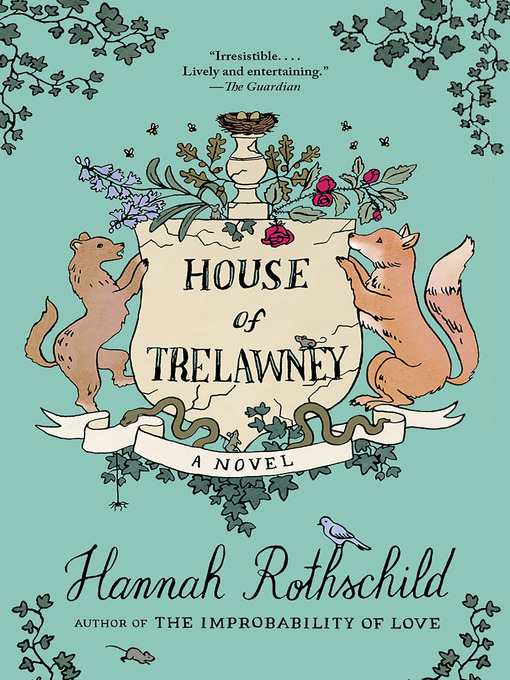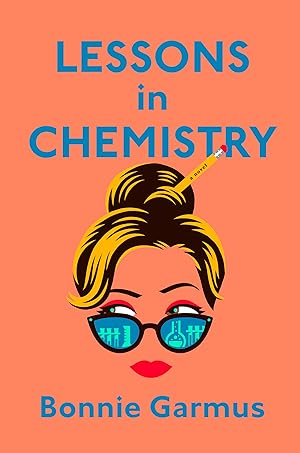Moonflower Murders by Anthony Horowitz
This is the second mystery in a series, the first was Magpie Murders.
And again, there is the book, and the PBS Masterpiece adaptation.
And once again, I found myself enjoying the PBS version more than the book.
I know, heresy. I make it a firm rule, to read the book before I watch any film or television adaptation. And in the past, I almost always prefer the book, but once again with this author — not in this case.
First the book:
I eagerly awaited Moonflower Murders despite being a hefty 608 pages. I very much enjoyed the cleverness and humor in Horowitz’s Magpie Murders.
Susan Ryeland, introduced in the first book, has returned to solve another mystery. She is now retired from publishing, living with her fiancée, Andreas, on a Greek Island, owning and managing a small hotel.
Being in a financial bind, Susan accepts an offer from the Treharnes to travel to London to analyze a murder mystery book, one written by her former client, Alan Conway. They hope it will provide clues about the recent disappearance of their adult daughter. They claim the idea for the book ‘Moonflower Murders’ had been modeled from a murder that occurred at their hotel eight years ago. The Trehearnes believe Susan’s knowledge of the book and her ties to the now deceased Alan will shed light on Cecily’s disappearance.
Susan just so happens to have edited the book that inspired by this murder (Alan Conway’s Atticus Pünd Takes the Case). The Trehearnes’ daughter, Cecily, disappeared after telling them that Alan’s novel holds the truth behind the 2008 murder.
Similar to Magpie Murders the novel is divided between Susan’s narrative and Alan’s novel. And just like before the book-within-a-book is peppered with obtuse anagrams, puzzles within puzzles, lots of clues, and many, many, characters to keep straight. I ended up spending so much time trying to connect the characters in the inner mystery to those in the outer that it I found it difficult to stay immersed in the story.
Full disclosure, I ended up not finishing the book, knowing that I had recorded the PBS series.
Now the PBS Masterpiece Series:
Just like with the television version of Magpie Murders, Moonflower Murders crosses back and forth in time allowing for a reprieve from the more classically-paced 1950’s mystery manuscript.
Atticus Pünd, the fictional detective from Alan Conway’s book in question, appears to her in the modern day mystery to advise and counsel Susan as she tries to solve Cecily’s disappearance.
And again, wonderfully, the same actors play dual characters in the manuscript and current day.The back and forth between fiction and reality is expertly done so much cleaner than the written book. I found the series so much less confusing and even liked the on screen characters better than in the book. (Leslie Manville is perfectly cast as Susan Ryeland.) As an added bonus, because I hadn’t finished the book – the ending was a complete surprise.
I eagerly watched, and fully enjoyed, every episode of the television series, and donated the book to my neighborhood little free library.
You can watch Moonflower Murders on PBS (on demand or stream HERE)
Here’s a taste
One final note, the book portrays the gay characters as predators and as perverts, not just in this book, but also in Magpie Murders. It’s predictable, offensive, and out of date. The PBS series avoids all of that.
Abandoned Books
Every so often I have to post about the books that I did not finish Abandoned books? I know, appalling for someone who’s barmy about books.
But I admit it, I sometimes don’t finish books – even those well-reviewed best sellers thrust upon me by bookish friends or praised by other book bloggers. It’s happening more and more often as I get older — you know the so little time, so many books theory.
The 50 page rule prevails — I’ll give any book at least 50 pages before I put it down…sometimes more. This cold rejection of an author’s herculean effort always tears me apart a little bit, and I put off writing one of these posts – as it feels somehow heartless.
But that’s why you’re here folks, so here goes.
Slipsworth by Simon Van Booy
This book was enthusiastically touted by Ann Patchett on her bookstore’s (Parnassus Books) Instagram feed. Ms. Patchett is one of my favorite authors, so I gave it a try.
From the book blurb: Following the deaths of her husband and son, Helen Cartwright returns to the English village of her childhood after living abroad for six decades. Her only wish is to die quickly and without fuss. Helen retreats into her home on Westminster Crescent, becoming a creature of routine and habit. Then, one cold autumn night, a chance encounter with an abandoned pet mouse on the street outside her house sets Helen on a surprising journey of friendship.
I got about 50 pages in and was struck by two things; the melancholy of this elderly woman without family or friends became just too sad and overwhelming, and then, when she becomes enamored with a mouse she lets into her home as a pet, I had to stop. It just became too silly and dare I say, trite.
Note: Also, I detest mice and I couldn’t get over the fact that she could care for one.
Lolly Willowes by Sylvia Townsend Warner
This book has been on my shelf and I took it down to read as it was recommended somewhere as a good Halloween read. It was written in 1926 and is considered a classic feminist novel…okay, I thought I’m in…
From the book blurb: When Laura Willowes’s beloved father dies, she is absorbed in the household of her brother and his family. There, she leaves behind “Laura” and enters into the state of “Aunt Lolly,” a genteel spinster indispensable to the upbringing of her nieces.
For twenty years, Lolly is neither indulgent nor impulsive, until one day when she decides to move to a village in the Chilterns, much to her family’s chagrin.
But it’s in the countryside, among nature, where Lolly has her first taste of freedom. Duty-bound to no one except herself, she revels in the solitary life. When her nephew moves there, and Lolly feels once again thrust into her old familial role, she reaches out to the otherworldly, to the darkness, to the unheeded power within the hearts of women to feel at peace once more .
I actually got more than halfway through this book, and found the prose beautifully written, and appreciated the biting humor describing Lolly’s/Laura’s predicament — being suffocated by controlling and overbearing relatives. Then when she finally breaks free, the descriptions of her newly found English countryside are wonderful. But wham! – the novel fell apart for me once she turned to witchcraft and even converses at length with the devil. It’s almost as if the first half of the book was written by one author and the other by another who hijacked the narrative and turned it into magical realism. Not for me after all.
The Lost Bookshop by Evie Woods
Now you all know I’m a sucker for books about books and bookshops, so I was pleased to get this from the library a couple of weeks ago. Again I gave it 50 or so pages and had to give up. Once again I stumbled into magical realism.
The premise held great promise – a lost bookshop in Ireland, a missing work from a Brontë sister, antique book dealing, and even a bookish romance at the ‘Shakespeare and Co.’ bookshop in Paris.
But there were just too many bizarre scenarios — magical tattoos, invisible characters, and shape-shifting houses — just to name a few. These elements jump in and around the narrative without much cohesion. I kept waiting for the plot to come together, but I kept getting more frustrated and returned it to the library unfinished.
The Life Impossible by Matt Haig
While, I adored Mr. Haig’s first novel How to Stop Time , I was not a fan of his second, The Midnight Library. So perhaps I only have myself to blame, had I read the reviews, of The Life Impossible, I might have realized I was getting into another novel of magical realism. But instead I was drawn in by the book’s blurb (I’m often susceptible and should know better).
When retired math teacher Grace Winters is left a run-down house on a Mediterranean island by a long-lost friend, curiosity gets the better of her. She arrives in Ibiza with a one-way ticket, no guidebook and no plan and searches for answers about her friend’s life among the hills and beaches of the island.
The Life Impossible is a one-sided conversation as Mr. Haig employs Grace’s 300 page email to a student describing all her experiences in Ibiza. The reader has to try to go along with it. The conversation is sweet and the message is a good one… but it’s all a bit wordy, a bit convoluted, and a weirdly out there.
We are asked to suspend belief with a tale of a magical light source found deep in a lagoon, and how the light transformed her and how she now sees her life in a whole new way. The reader tries to pay attention but in the end you are bored out of your gourd.
The Diary of a Provincial Lady by E. M. Delafield
Okay, I was sick of magical realism, so turned to my shelves to find something real, something I could sink into. Written in 1934, the day to day life of this provincial lady is not very exciting, she manages the household budget (badly), tries not to upset the staff or dote on her children too much, gets annoyed with the local ‘bigwig’, gets involved in local fundraising efforts, meets friends and enters writing competitions.
It is all told with a wry humor, which makes the book enjoyable, but I had to put it aside, after I read the first four chapters, it was just too slow and actually not very interesting.
I have since learned, this was never meant to be a novel, but was originally published in a women’s magazine as a series of anecdotes. I am undecided on whether to keep it or not – perhaps to dip into once and awhile. Yes, I am shallow and may hang on to it just for the lovely cover.
So that’s my sad story, a good pile of books to drop off at my various little free libraries around my neighborhood.
But wait, just wait – I’m saved! I purchased this just the other day from my favorite independent bookstore. Oh pure book barmy joy!
So, I’m going to sneak away — leave the unfinished books, and politics (sigh) – behind for awhile.
See you later. Hoping you also have a good book to take your away.
A Handful of Dust by Evelyn Waugh
When laid low with Covid, I watched the film – “A Handful of Dust”, with a great cast ~~ Kristen Scott Thomas, Judy Dench, Stephen Fry and Alec Guiness ( just to name a few). I very much enjoyed this sad, and yet, beautiful film. The story lingered on my mind days afterwards.
Later, I remembered I had a copy of book by Evelyn Waugh and pulled it down from my shelves
(People, this is why I have so many books I haven’t read – there it was, just waiting for me – oh what pleasure!)
I started this book version just thinking I would browse through it, but soon found myself equally immersed.
The book opens with this quote:
. . . I will show you something different from either
Your shadow at morning striding behind you
Or your shadow at evening rising to meet you;
I will show you fear in a handful of dust.”
——-The Waste Land, T.S. Eliot
Published in 1934, A Handful of Dust is a satirical novel that offers a social perspective of life among the upper classes in England in the early twentieth century. The socially privileged thrive on club membership, nightly parties, and the latest gossip. They keep up a charade of manners, a seemingly glamorous existence to which the poorer classes aspire.
Brenda and Tony Last have been married for five years, when we meet them. Tony adores his ancestral house, Hetton, his young son, John Andrew and his wife, Brenda. But it soon becomes apparent, the beautiful Brenda is bored to tears.
After a half meant invitation for the weekend, John Beaver appears at the door of Hetton. Beaver is a scrounging young man, who hangs around bars hoping to be brought a drink, has no job and little income, but is a useful ‘spare man,’ ready to drop everything for a free lunch, or dinner party. After the weekend visit, Brenda begins an affair with this dull and idiotic social climber even going so far as to rent out a flat in London, telling Tony that she’s studying economics while she’s carrying on this affair — which everyone in their social circle knows about except her dim-witted husband.
When tragedy strikes – I won’t spoil things by revealing the event and the astonishing reaction to it – Brenda insists on a divorce.
Tony devastated, sets off on an expedition to look for a lost city in Brazil organized by a chap he met and was instantly intrigued. Tony finds himself reading Dickens in the jungle for a truly insane explorer. I can’t tell you any more, but it is harrowing. (I read that Mr. Waugh drew on his own experiences from a trip to Guyana to write this second part of the book.) Even thought I knew what was going to happen from the film, the book’s conclusion was still devastating.
Seldom do I watch a film before I’ve read the book, but in this case I found both equally riveting. The film is well acted and beautifully filmed. It follows the novel fairly closely but it was a sad and desperate story
The book is deeper, with a more satirical (and often funny) critique of the social classes in Britain during that time period. Mr. Waugh seems to both criticize and admire English aristocrats, and he is especially fascinated with their homes and architecture — not to mention the Catholic church. This makes for a seductive combination, which left me feeling I had inhabited the society described.
Where the book fell a little flat, was the characters didn’t come to life as well as in the film. Or, perhaps I just couldn’t help visualizing the actors in the film. The book does do a wonderful job of mixing both the tragedy and comedy. The characters are so hapless and awful but with Mr. Waugh’s brilliant writing and descriptions you can’t stop reading. (It was also interesting to read the alternative ending Waugh wrote.)
As I put the book back on my shelf next to my other Evelyn Waughs’, I noticed my copy of Brideshead Revisited, and realized I had done the same thing with that novel. First I saw the infamous and beautiful film, and was so transformed by it, I had to immediately read the novel.
From the book blurb:
“The most nostalgic and reflective of Evelyn Waugh’s novels, Brideshead Revisited looks back to the golden age before the Second World War. It tells the story of Charles Ryder’s infatuation with the Marchmains and the rapidly-disappearing world of privilege they inhabit. Enchanted first by Sebastian at Oxford, then by his doomed Catholic family, in particular his remote sister, Julia, Charles comes finally to recognize only his spiritual and social distance from them.”
Both novels/films are about human relationships gone awry — sad, desperate, and cynical. And like a train wreck – one can’t stop watching/reading or look away,
Either are a good place to start with Evelyn Waugh.
Pure coincidence, Ann Patchett just recommended the same two novels.
You can view her video HERE
Two Good Films
During my bout with COVID, I watched a couple of old films – well not that old, but not recent. And yes, I had seen them both before, but they once again were absorbing and a couple of scenes still choked me up. I didn’t plan it this way, but both dealt with very similar themes.
Dead Poets Society
A new English teacher, John Keating (played by the late Robin Williams), is introduced to an all-boys preparatory school that is known for its ancient traditions and high standards. He uses unorthodox methods to reach out to his students, who face enormous pressures from their parents and the school. With Keating’s help, students Neil Perry (Robert Sean Leonard), Todd Anderson (Ethan Hawke) and others learn to break out of their shells, pursue their dreams and seize the day.
Favorite quote: Medicine, law, business, engineering, these are noble pursuits and necessary to sustain life. But poetry, beauty, romance, love, these are what we stay alive for.
Neil Perry’s performance as Puck in a school production of A Midsummer Nights Dream, is just magical and his fate afterwards is simply heartbreaking.
Mona Lisa Smile
Katherine Watson (Julia Roberts) is a recent UCLA graduate hired to teach art history at the prestigious all-female Wellesley College, in 1953. Determined to confront the outdated mores of society and the institution that embraces them, Katherine inspires her traditional students including Betty (Kirsten Dunst) and Joan (Julia Stiles) to challenge the lives they are expected to lead.
This is a female variant of Dead Poets Society and I found it lacking a little. Strangely, Julia Roberts is outshone by the acting of her students. But, again well worth re-watching.
Yes, folks I was sick and not up to much intellectual challenge, but if you come across either of them – even if you’ve seen them before – give them a try.
Between Two Kingdoms by Suleika Jaouad
I always find it difficult to review a memoir. How does one comment on another person’s life experiences? Often, if it’s well written and when I find myself relating to and/or learning from a memoir – then I can go from there.
Such was the case with Between Two Kingdoms. Ms. Jaouad is best known for her Emmy-award winning column titled “Life Interrupted”. Her writings have been featured in many magazines and she has appeared on NPR. And finally, she is featured in Jon Batiste’s documentary “American Symphony” — but more on that later*.
You might question, like I did, if you really want to read about a young woman’s experience with cancer. So, I entered the book gingerly, but quickly found her story captivating and both devastating and uplifting in equal measures.
Ms. Jaouad tells of her leukemia diagnosis at just 22 years of age and the toll this disease took not just on her life, but also on the lives of her family, friends and her relationship with a wonderful man. But despite all of those things, she was a survivor ready to pick up where life left off. Rather than succumb to depression, instead she picked herself up and took steps to actively re-engage in life (a study guide for anyone).
Her writing is beautiful and brave as she shares how the cancer ravaged her body. Her writing is painfully honest and — fair warning — she does not shy away from sharing the details. I never thought it possible to write poetically about nausea – but she does. One can certainly see why she is a respected reporter.
Everyone who is born holds dual citizenship, in the kingdom of the well and in the kingdom of the sick,” Susan Sontag wrote in Illness as Metaphor. “Although we all prefer to use only the
good passport, sooner or later each of us is obliged, at least for a spell, to identify ourselves as citizens of that other place.
But it’s not all gloom and doom, Ms. Jaouad also has an adventure story. While a patient in Sloan Kettering, she wrote articles about her real-time experience fighting cancer which were published in her New York Times column “Life Interrupted”. This fame sparked a correspondence with other cancer warriors across the country. In an adventuresome exercise, when Suleka’s health improves she takes off on a 100-day 15,000 mile car ride across the country to visit some of these people whom she had become to know. This road trip is full of surprises, warm meetings, and much bad driving.
Between Two Kingdoms is not only marvelous storytelling, it is also an insight into one woman’s struggle to make sense of a world that seems impossibly and devastatingly uncertain. Ms. Jaouad gives her experience eloquence without shying away from the hard truths.
All of us have experienced cancer – either your own or a loved one’s. If you’re like me, you’ll perhaps find that Ms. Jaouad’s memoir deepens the way you view sickness, recovery…and the importance of loved ones throughout the battles. In the end, this memoir is an uplifting celebration of life – as they say through sickness and in health.
* N.B. “American Symphony” is a Netflix documentary about musician, Jon Batiste, who sets out to compose a symphony. But, Ms. Jaouad, his life partner, learns that her cancer has returned. The documentary showcases the portrait of these two artists at a pivotal crossroads in their relationship and their respective creative journeys. Well worth watching – with a box of tissues nearby — and his music is just wonderful.
House of Trelawney by Hannah Rothschild
Maybe you remember I really enjoyed Ms. Rothschild’s other novel – The Improbability of Love, so when I read about another novel by her, I had to download it from my library.*
One of the books I read while traveling, House of Trelawney, was both engaging, fascinating, and yet also, somewhat infuriating. Here is another novel where the house is as much a central character as the people.
So first, the house — (and I’m quoting here) — for more than seven hundred years, the vast, rambling Trelawney Castle in Cornwall–turrets, follies, a room for every day of the year, four miles of corridors and 500,000 acres–was the magnificent and grand a “three dimensional calling card” of the earls of Trelawney. By 2008, it is in a complete state of ruin due to the dulled ambition and the financial ineptitude of the twenty-four earls, two world wars, the Wall Street crash, and inheritance taxes.
But as you read deeper into the novel, this is no romantic, rundown manor — there is no heating, sometimes no hot water, and there are gaps where the auctioned paintings used to be — it’s filled with mold, rodents, and decaying filth. This is the stark reality of their situation.
The story is set during the 2008 global economic crisis. A time which almost brought down the world’s financial systems. That, along with the disintegration of the British antiquated class system provide backdrops to the Trelawney family story, which takes place at the estate in Cornwall and London.
This is a big, tempestuous story of an English family trying to save their family estate – but not only is the physical estate disintegrating, so is their lifestyle, and family bonds. The entwined story of these characters and the house twists around inheritance, personal interests, class standards and drive (or lack thereof) across three generations. All sprinkled with satire, wit, and some marvelous writing.
This story line of a rapidly-disappearing world of privilege is very reminiscent of Julian Fellows (of Downton Abby fame) and the humor reminded me of Evelyn Waugh (Note: more on Waugh in a future post here).
There is a great assortment of characters – so take a deep breath and see if you can follow along. There is Jane, the daughter in law who works hard and sacrifices for Kitto, her husband, and his family. The grandmother who refuses to let go of the standards of centuries past. Then there is the incompetent Ambrose, the oldest son of Kitto and Jane, a youth even more callow and incompetent than his father or grandfather. We spend time with Arabella, younger sister of Ambrose, who develops an interest in entomology from her eccentric Aunt Tuffy who scrapes fleas off animal corpses for research. Finally there is Tony Scott, younger brother to the old Earl, is now an aging, impoverished art dealer who lives in a London bed-sit (aka studio apartment).
The reader must pay attention, as each chapter addresses a different point in time, skipping around a day or week later, and sometimes three months between, but not to worry you’ll get used to it, and it’s easy to go back and check where you are in the time frame.
There’s not a great deal of plot; the book is much more of a character study of the family as they try to deal with modernity, while holding on to a life style and titles that no longer have meaning or relevance..
If the novel has one fault, it is the on again, off again, romance between Blaze and Joshua, It became irritating after a while, and somewhat contrived, as it didn’t fit in with the black humor that made this book so much fun for me. Also, the ending seemed very sudden with many loose ends left untied.
Most fascinating for me was the extensional question — who came out better — those who inherit or those who break away to a different life.
I found House of Trelawney a grand read – for me escapism, humor, and I have to admit, with a bit of British aristocracy schadenfreude (look it up, great word).
N.B. * If you have a digital reader of any sort, check out your library’s digital book system — called Overdrive and/or Libby. Clearly explained on your library website or go and get instructions from your librarian. You can download books from anytime and anywhere. I downloaded this novel while sitting on the deck of our ship in Norway.
Lessons in Chemistry by Bonnie Garmus
Sorry to cheat, but this, from the book’s publicity blurb, perfectly captures this entertaining novel:
“Chemist Elizabeth Zott is not your average woman. In fact, Elizabeth Zott would be the first to point out that there is no such thing as an average woman. But it’s the early 1960s and her all-male team at Hastings Research Institute takes a very unscientific view of equality. Except for one: Calvin Evans; the lonely, brilliant, Nobel–prize nominated grudge-holder who falls in love with—of all things—her mind. True chemistry results.
But like science, life is unpredictable. Which is why a few years later Elizabeth Zott finds herself not only a single mother, but the reluctant star of America’s most beloved cooking show Supper at Six. Elizabeth’s unusual approach to cooking (“combine one tablespoon acetic acid with a pinch of sodium chloride”) proves revolutionary. But as her following grows, not everyone is happy. Because as it turns out, Elizabeth Zott isn’t just teaching women to cook. She’s daring them to change the status quo.” (End of quote.)
It’s been a long time, since I enjoyed a character as much as Elizabeth Zott. I cheered and chuckled as she makes her way through the 1950’s and 60’s as a scientist. A woman ahead of her time, she accepts no limitations, she walks right over fragile male egos, and she could care less that she isn’t accepted at the almost entirely male Hastings Institute.
Then she meets another scientist, Calvin Evans, who doesn’t fit in either. They fall in love and move in together, because Zott doesn’t believe in marriage — her religion is science. When she discovers she is pregnant and a single mother (you’ll have to read the book to find out why), Zott is fired and her financial circumstances leads her to become an unlikely, reluctant and uncompromising television star, with her popular TV cooking show, ‘Supper at Six’,
She refuses to wear the ultra-feminine (and tight) dresses chosen for her, and instead, dresses in a lab coat with a pencil stuck in her hair. Rather than a typical cooking show, she focuses on the chemistry of cooking, using chemical names for the ingredients, and developing recipes that are a fresh and healthy change from 1960’s cooking. The show becomes wildly popular with home makers everywhere, and no one is more surprised than Zott herself.
Zott’s daughter was one of my favorite characters – a precociously bright four-year old, Mad, an early reader, voraciously consuming the likes of Norman Mailer and Charles Dickens.
Because while musical prodigies are always celebrated, early readers aren’t. And that’s because early readers are only good at something others will eventually be good at, too. So being first isn’t special – it’s just annoying.
Not only did I love the immediate family of Elizabeth, Madeline and the rescued dog Six Thirty, I also was enamored with the other characters — Mrs. Sloane, Dr. Mason, Rev. Wakefield, Walter – her found family who loves her and provides the support she needs as a single working mom.
Lessons in Chemistry is a intelligent, witty and wonderful. The writing here is smart and engaging. I found myself chortling over phrase after phrase – and the veracity of them – here’s a few of my favorites quotes:
“When it came to equality, 1952 was a real disappointment.”
“Elizabeth Zott held grudges too. Except her grudges were mainly reserved for a patriarchal society founded on the idea that women were less. Less capable. Less intelligent. Less inventive. A society that believed men went to work and did important things—discovered planets, developed products, created laws—and women stayed at home and raised children.”
“No surprise. Idiots make it into every company. They tend to interview well.”
“(On religion) “I think it lets us off the hook. I think it teaches us that nothing is really our fault; that something or someone else is pulling the strings; the ultimately, we’re not to blame for the way things are; that to improve things, we should pray. But the truth is, we are very much responsible for the badness in the world. And we have the power to fix it.”
“It’s just that we tend to treat pregnancy as the most common condition in the world—as ordinary as stubbing a toe—when the truth is, it’s like getting hit by a truck. Although obviously a truck causes less damage.”
“Every day she found parenthood like taking a test for which she had not studied. The questions were daunting and there wasn’t nearly enough multiple choice.”
This was a great read and I enjoyed every page. Some of the situations are a bit far-fetched and strain believably but again, this is fiction and fun fiction.
Elizabeth Zott brought to mind some of my other favorite, unconventional, independent women characters – (click on each to read more about them).
Lillian Boxfish Euridice Gusmao Eleanor Oliphant Flavia de Luce
Once again, excuse me if I use another reviewer’s quote – it matches my feelings exactly.
“The most delightful novel I read this year—fresh and surprising—was Lessons in Chemistry: a fish-out-of-water story about a feminist hero who never stops pushing for what’s right. (I laughed out loud!)”
—Philip Galanes, The New York Times
This is Ms. Garmus’s debut novel – and it is a winner. I eagerly await her next.
A digital review copy was provided by Doubleday Books via Netgalley.
Yes, they’ve made a TV series based on the book. It airs on Apple TV which I don’t get. It received some pretty good reviews ~~ but as always I recommend reading the book first.


